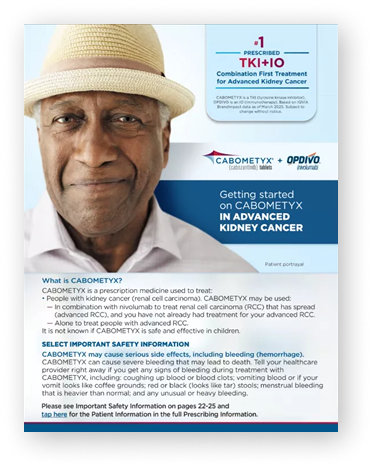Patient portrayal

Learn about CABOMETYX in advanced kidney cancer*
*renal cell carcinoma (RCC)
What is CABOMETYX?
CABOMETYX is a kind of non-chemotherapy prescription medicine called a tyrosine kinase inhibitor (TKI). It is given as a tablet and taken once a day, or as directed.
It is used to treat:
- People with advanced kidney cancer alone or in combination with a medicine called OPDIVO® (nivolumab) if you have not already had treatment
How CABOMETYX may help
CABOMETYX is proven to help certain people with advanced kidney cancer in clinical studies.

If you have advanced or Stage 4 kidney cancer that hasn’t been treated, CABOMETYX could help.
CABOMETYX was tested and evaluated as a first treatment in a clinical study.
The CABOMETYX clinical study enrolled people with kidney cancer that had spread beyond the kidney into other areas of the body. This would be their first treatment for advanced kidney cancer, also known as first-line treatment.
People stayed on treatment until their tumors started to grow, or they had a side effect that could not be managed.
In the study:

323 people took CABOMETYX (orally) + OPDIVO (infusion). OPDIVO was taken for up to 2 years

328 people took sunitinib* (orally)
Here are 2 analyses of the clinical study at different time points:
The first analysis was done to support approval of CABOMETYX + OPDIVO as a combination treatment for people with advanced kidney cancer who have not had prior treatment.
This clinical study looked at people's results at a median† of 18.1 months follow-up, or 1½ YEARS.
A later analysis, which is typical for clinical studies, looked at people's numbers at a median† of 67.6 months follow-up, or 5½ YEARS.
The follow-up analysis was not based on the same type of testing as the first analysis and should not be considered definitive.
Results of CABOMETYX + OPDIVO
Proven results at 1½ YEARS
On average, people taking CABOMETYX + OPDIVO went longer without tumors growing or spreading
People were able to
Live without
tumor growth 2x
longer
Median† of 16.6 months for CABOMETYX + OPDIVO vs 8.3 months for sunitinib (based on people's results at a median† of 18.1 months follow-up)
Individual results may vary.
Follow-up analysis at 5½ YEARS
Average number of months people went without tumors growing or spreading
Median† of 16.4 months for CABOMETYX + OPDIVO
8.3 months for sunitinib
(based on people's results at a median† of 67.6 months follow-up)
Please consider that the follow-up analysis was not based on the same type of testing as the 1½-year analysis and is not definitive; individual results may vary.
Proven results at 1½ YEARS
CABOMETYX + OPDIVO reduced the risk of dying by 40% vs sunitinib. At the time the study was analyzed, the median† survival time for both treatments was still unknown because many people were still living.‡
Individual results may vary.
Follow-up analysis at 5½ YEARS
Average number of months people lived
46.5 months for CABOMETYX + OPDIVO 35.5 months for sunitinib
Median* Overall Survival
Percent of people alive at 5 years
41% for CABOMETYX + OPDIVO
35% for sunitinib
Please consider that the follow-up analysis was not based on the same type of testing as the 1½-year analysis and is not definitive; individual results may vary.
Proven results at 1½ YEARS
Tumors shrunk in
size in 2x as many
people
55.7% CABOMETYX + OPDIVO vs 27.1% sunitinib (complete + partial responses)
Tumors disappeared
completely in
almost 2x as many
people
8% CABOMETYX + OPDIVO vs 4.6% sunitinib (complete response)
Individual results may vary.
Follow-up analysis at 5½ YEARS
Percent of people with tumors that shrunk in size
55.7% for CABOMETYX + OPDIVO
27.4% for sunitinib
(complete + partial responses)
Percent of people with tumors that disappeared completely
13.9% for CABOMETYX + OPDIVO
4.6% for sunitinib
(complete response)
Please consider that the follow-up analysis was not based on the same type of testing as the 1½-year analysis and is not definitive; individual results may vary.
Study results at 1½ YEARS
Percent of people with tumors that stabilized or shrunk
88%
of people taking CABOMETYX + OPDIVO 32.2% stabilized and 55.7% shrunk

69%
of people taking sunitinib
42.1% stabilized and 27.1% shrunk
5.6% of people progressed with CABOMETYX + OPDIVO vs 13.7% of people with sunitinib
Please consider that this analysis is not definitive and individual results may vary.
Follow-up analysis at 5½ YEARS
Percent of people with tumors that stabilized or shrunk
88%
of people taking CABOMETYX + OPDIVO 32.2% stabilized and 55.7% shrunk

69%
of people taking sunitinib
41.5% stabilized and 27.4% shrunk
6.5% of people progressed with CABOMETYX + OPDIVO vs 14.3% of people with sunitinib
Please consider that the follow-up analysis was not based on the same type of testing as the 1½-year analysis and is not definitive; individual results may vary.
Why did some numbers increase and others decrease?
The way tumors respond to treatment changes over time. This means the tumors themselves may change over time. When this happens, the numbers increase or decrease to reflect these changes.
-
Disappeared completely is known as a complete response and means the disappearance of signs of cancer in response to treatment; this does not necessarily mean the cancer has been cured.
-
Stabilized (stable disease) means that changes in tumor sizes were too small to be reported as growing or shrinking. This may be due to how tumors behave naturally rather than any effect of the medicine.
-
Partial response is a decrease in the size of a tumor, or in the extent of cancer in the body, in response to treatment.
- *
-
Sunitinib is a prescription medication used to treat adults with advanced kidney cancer.
- †
-
Median is the middle value in a set of measurements—for some, it was shorter; for others, longer.
- ‡
-
In the preplanned final analysis, median overall survival was 37.7 months for CABOMETYX + OPDIVO and 34.3 months for sunitinib (based on people's results at a median† of 32.9 months follow up).

CABOMETYX was proven to help certain people with advanced kidney cancer live longer without their tumor progressing in a clinical study.
CABOMETYX was compared with a medicine called sunitinib* in a clinical study of people with advanced kidney cancer. All people in the study had one or more established risk factors and had not previously received medicine to treat their advanced kidney cancer.
In the study:

79 people took CABOMETYX

78 people took sunitinib
People stayed on treatment until their tumor started to grow again or they had a side effect that could not be managed.
Study results showed:
On average, people taking CABOMETYX went longer without tumors growing or spreading
People were able to
Live without
tumor growth
longer
Median† of 8.6 months vs 5.3 months for sunitinib
Individual results may vary.
- *
-
Sunitinib is a prescription medication used to treat adults with advanced kidney cancer.
- †
-
Median is the middle value in a set of measurements—for some, it was shorter; for others, longer.

CABOMETYX was proven to help certain people with advanced kidney cancer in a clinical study
People had taken at least one other medicine to treat their advanced kidney cancer before taking CABOMETYX.
People stayed on treatment until their tumors started to grow or they had a side effect that could not be managed.
In the study:

330 people took CABOMETYX

328 people took a medicine called everolimus*
Study results showed:
On average, people taking CABOMETYX went longer without tumors growing or spreading
People were able to
LIVE WITHOUT TUMOR
GROWTH ALMOST
2x
LONGER
Median† of 7.4 months vs 3.8 months for everolimus
On average, people taking CABOMETYX had increased survival
People were more likely to
Live longer
Median† of 21.4 months vs 16.5 months for everolimus
On average, people taking CABOMETYX had a greater rate of tumor reduction
Tumors shrunk
in size for
5x
more people
17% for CABOMETYX vs 3% for everolimus. In the clinical study, the tumor had to shrink by at least 30% and had to be confirmed by a second scan
Individual results may vary.
- *
-
Everolimus is a prescription medicine used to treat adults with advanced kidney cancer when certain other medicines have not worked.
- †
-
Median is the middle value in a set of the measurements—for some, it was shorter; for others, longer.

The combination of cabozantinib, a TKI, and nivolumab, an IO, is a preferred first-line treatment option for certain people with advanced clear-cell and non-clear-cell kidney cancer (RCC) by a group of leading U.S. cancer centers
The group is known as the National Comprehensive Cancer Network® (NCCN®) and is dedicated to improving and facilitating quality, effective, equitable, and accessible care. Preferred interventions are interventions that are based on superior efficacy, safety, and evidence; and, when appropriate, affordability.
Referenced with permission from the NCCN Clinical Practice Guidelines in Oncology (NCCN Guidelines®) for Kidney Cancer V.1.2026. © National Comprehensive Cancer Network, Inc. 2025. All rights reserved. Accessed July 31, 2025. To view the most recent and complete version of the guideline, go online to NCCN.org. NCCN makes no warranties of any kind whatsoever regarding their content, use or application and disclaims any responsibility for their application or use in any way.
Side Effects
Hear a Patient and Doctor Share Their Perspectives About Side Effects
Thomas Hutson, D.O., Pharm.D., and Rosa, an actual patient, talk about the importance of knowing what to expect with side effects of CABOMETYX.
This video features a real patient and doctor to show one individual’s treatment experience with CABOMETYX. Some participants were paid for their time and expenses in sharing their story. Individual results may vary. The information in this video is not intended as medical advice. Your healthcare team is your best resource for information about your treatment. If you have any questions about your condition or treatment, contact your healthcare team.
What are the most common side effects of CABOMETYX?
Taking CABOMETYX may cause side effects. The most common side effects of CABOMETYX include: tiredness, nausea and vomiting, constipation, decreased appetite, and weight loss.
The most common side effects of CABOMETYX when used with nivolumab include: tiredness, mouth sores, rash, low thyroid hormone levels (hypothyroidism), pain in muscles, bones, and joints, decreased appetite, nausea, changes in the way things taste, stomach-area (abdominal) pain, cough, and upper respiratory tract infection.
Learn about additional side effects, including serious side effects associated with CABOMETYX here.
LEARN MORE ABOUT

CABOMETYX Handbook
Download this resource to learn more about CABOMETYX, and help you discuss with your doctor if it is right for you.

BE CONNECTED with CABOMETYX®
The BE CONNECTED support program provides educational information for you or someone you are caring for who is taking CABOMETYX.
OPDIVO® and the related logo are registered trademarks of Bristol-Myers Squibb Company.
